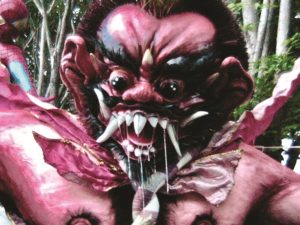We knew the waves were good. The surf reports showed it. There was a big south swell sweeping in from the Indian Ocean onto the reefs to the west. The wind was a light offshore.
We knew, too, that the waves were completely empty. It was Nyepi Day on Bali. Not a single surfer would be in the water. Everyone on the island was to stay inside from sunrise until dawn the following day. The island’s survival depended on it.
Nyepi is a day of silence, observed in Balinese Hinduism, for reflection, restraint, and meditation. Anything unnecessary is prohibited. The entire island shuts down and goes quiet. Businesses close. The airport suspends flights. The streets, usually vibrant and chaotic, are silent. The only movement outside is the chickens, scratching leaf litter, and cats, slinking along the tops of ornate stone walls. There is no music, no dancing, no eating, no burning of incense. Lighting fires is forbidden. Everyone must stay inside. The people of Bali, the island itself, hang in the balance.
On Nyepi Day, evil spirits descend on the island in search of a place and a people to inhabit. Only by making the island appear uninhabited will the spirits pass the island by.
The temptation to sneak out and take the goat path to the ocean tugged at our sleeves. We wanted to surf perfect, empty waves. But the threat of our selfishness bringing ruin to the entire island held us back. Besides, there was the Pecalang: the Balinese spiritual police, patrolling the streets in search of offenders.
The day before Nyepi, Ogoh Ogoh Day, a massive celebration takes place. A parade draws the attention of the evil spirits, to wake them from wherever they hide. Gigantic puppets depicting them are carried through the streets. They are fiery red and eggplant purple, their eyes bulging, faces contorted. Some have eight arms and three heads. They represent temptations, vices, corruption — some new and superficial, some deep and ancient. One carries a cell phone and a selfie stick. Some are twisted in acts of lust. Others are thieves or two-faced liars.

Babi Guling, a roast suckling pig, is carved and served. Arak, a homemade rice alcohol, flows like rainwater. It is carried in gasoline cans, burns like gasoline going down, and will give you the worst hangover you can imagine. When the spirits come the following day, looking for a people to infect with their evils, they find an empty island. The old bait and switch.
The silence of Nyepi Day is an act of collective social cooperation and responsibility. No one wants to spend the entire day inside, refraining from the pleasures of daily life. But they do it. They do it for their neighbors, for their families, for the magical island they call home.
My friends and I stayed in. We read. We drank beer. We counted pearls collected by the owner of the house we rented. From the windows we watched chickens scratching beneath the trees, kitties lounging in the shade, the sunlight and the blue sky.
A shadow passed. Was it a bird? We lay with our sweaty backs against the cool tile floor and told stories. Someone moved, and the suction of his sweaty back against the tile made a loud farting noise. We fell apart laughing and spent the next hour squishing our backs against the tile, cracking up at the variety of fart sounds we could make.
The next morning, we rose at dawn and set off down the goat path. The island began to glow in the gentlest of morning light. The birds sang in the trees. Everyone must have stayed in. The evil spirits had passed. The island was safe. The people had all done their part.



